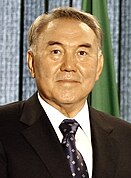Kazakhstan presidential election, 2005
|
|
|||||||||||||||||
|---|---|---|---|---|---|---|---|---|---|---|---|---|---|---|---|---|---|
|
|||||||||||||||||
|
|||||||||||||||||
|
|||||||||||||||||
Kazakhstan held a presidential election on 4 December 2005. Incumbent President Nursultan Nazarbayev, in power since 1989, sought and won another seven-year term against four other candidates. Opposition candidates were allowed some access to the mass media, but this was still restricted. According to western election observers, opposition candidates also suffered considerable harassment. The Organisation for Security and Cooperation in Europe (OSCE) criticized the elections, calling them unfair, but noted improvements.
Zamanbek Nurkadilov, described as the leading figure of the opposition, was unable to take part, having died shortly before the election. A former mayor of Almaty and government minister, Nurkadilov had joined the opposition. He was found shot dead in November, shortly after reportedly saying that he would go public with documents proving government corruption. Near his body was "a pillow pierced by bullets that may have been used as a silencer". The official cause of death was presented as suicide, with a report stating that Nurkadilov had shot himself twice in the chest and then once in the head.
Onalsyn Zhumabekov, Chairman of Kazakhstan’s Central Election Commission, declared the election valid. About 1,600 observers monitored the election, including 465 from the influential Organisation for Security and Cooperation in Europe (OSCE).
Bruce George, coordinator for observers from the Organisation for Security and Co-operation in Europe, was highly critical of the election: "Regrettably, despite some efforts which were undertaken to improve the process, the authorities did not exhibit sufficient political will to hold a genuinely good election."
The OSCE has gone on record noting the following issues with the election "Unauthorised persons interfering in polling stations, cases of multiple voting, ballot box stuffing and pressure on students to vote were observed during voting and during the count, observers saw tampering with result protocols and a wide range of procedural violations."
...
Wikipedia


